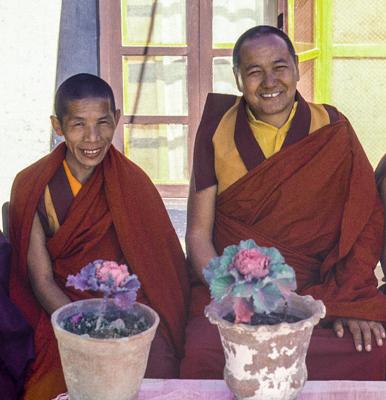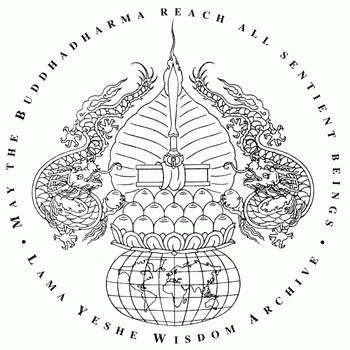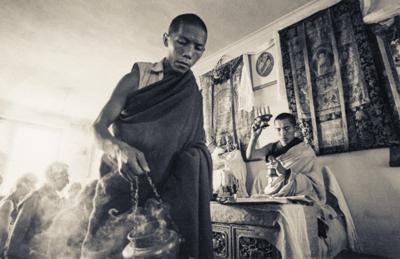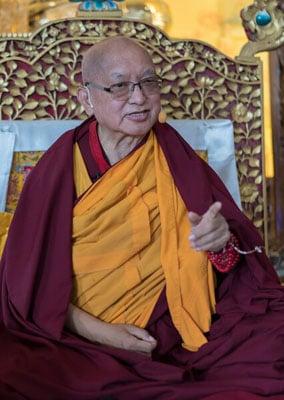E-letter No. 254: August 2024

Dear Friends,
Thanks for subscribing to our monthly eletter. Please feel free to share it with others!
In this month's issue, we are happy to present a new video featuring Lama Lhundrup, along with a new podcast from the archive. We also highlight the latest installment of the Big Love Audiobook Heart Project; several lectures by Lama Zopa Rinpoche from the 52nd Kopan Course; we’ve introduced a new planned giving page on our website; added fresh advice to Lama Zopa Rinpoche’s Online Advice Book; and a teaching on emptiness by Rinpoche. Read on and enjoy!
Create Your Dharma Legacy

Discover how you can contribute to your Dharma legacy and leave a lasting impact by visiting our new Create Your Dharma Legacy page on our website. A planned gift will be vital in sustaining our efforts and making a meaningful difference for future generations. Learn how a legacy gift can ensure your Dharma impact lasts for generations by supporting LYWA's mission to preserve and publish the precious teachings of Lama Yeshe and Lama Zopa Rinpoche.
Be sure to visit our newly updated What We Do and Who We Are pages to learn more about the amazing team we’ve assembled at the Archive, and to read an overview of our mission and work. If you have any questions, please don’t hesitate to email us. Thank you for all your continued support!
FROM THE VIDEO ARCHIVE: Khensur Rinpoche Lama Lhundrup Rigsel
This month from the LYWA video archive, we are excited to present a special offering! Experience Lama Lhundrup’s teachings on how meditation can help you make the most of this precious human life. The video, which includes subtitles, was filmed by Jim Hagan. You can discover more about Lama Lhundrup’s life here and read about the details of his passing in 2011 here.
Visit and subscribe to the LYWA YouTube channel to view more videos freely available from our archive. See the FPMT YouTube channel for many more videos of Lama Zopa Rinpoche’s teachings.
ON THE LYWA PODCAST: Change Your Attitude, Change Your Action

The ego, or self-cherishing thought, is far more harmful than all the atomic bombs in the world. Even if an atomic bomb were to explode, dying with the thought of bodhicitta would not cause rebirth in the hell or lower realms.
– Lama Zopa Rinpoche
This month on the LYWA Podcast, Lama Zopa Rinpoche explores how Shakyamuni Buddha was once just like us until he transformed his attitude from ego to bodhicitta. Rinpoche explains that the ego causes more harm than even the most powerful weapon and must be abandoned. This teaching was given during the 33rd Kopan Course in 2000. You can follow along with the unedited transcript on our website.
The LYWA podcast contains hundreds of hours of audio, each with links to the accompanying lightly edited transcripts. See the LYWA podcast page to search or browse the entire collection by topic or date, and for easy instructions on how to subscribe.
BIG LOVE AUDIOBOOK HEART PROJECT

We are happy to share another audiobook installment of Big Love: The Life and Teachings of Lama Yeshe, written by Adele Hulse. Organized by Janet Brooke, this heart project is comprised of narrations recorded by personal friends of the late Åge Delbanco (Babaji), one of Lama Yeshe's earliest students.
This month the Big Love Heart Project brings you Chapter 11: 1973: First Steps, First Students, narrated by Janet Brooke. Chapter 11 includes the arrival of Lama Pasang and Lama Lhundrup to Kopan, the travels of Lama Yeshe to Lawudo and Dharamsala, and the events of the fourth and fifth Kopan meditation courses.
WHAT'S NEW ON OUR WEBSITE

This month we have posted several lectures given by Lama Zopa Rinpoche at the 52nd Kopan Course in 2019. Rinpoche’s main emphasis during this course is on emptiness, which he explores in great depth using the wonderful verse from the Vajra Cutter Sutra, “A star, a defective view, a butter lamp flame…” as a basis. An excerpt from Lecture 2 of this course is included in the monthly teaching below.
As we announced in our last enews, an ebook of Rinpoche’s teachings from the 52nd Kopan Course is forthcoming. This will be the first of a new ebook series published by LYWA. The plan is to convert all the Kopan courses into ebooks, including those already published on our website and those not yet published. Read more about the Kopan eBook Project here.
We’ve also added new entries to Lama Zopa Rinpoche’s Online Advice Book. Each year, we include over 100 new pieces of advice on various topics, bringing the total to more than 2,500 entries now available on our website.
- Mindfulness of Ultimate Reality: Rinpoche advised the importance of emptiness meditation in this letter for a student who asked about retreat and practice.
- Transforming Suffering into Happiness: A student’s mother was suffering from anxiety disorder and depression, brought on by worry about high blood pressure and vertigo. Rinpoche sent this advice about transforming problems.
-
Enjoy the Purification: Rinpoche gave this advice to students who had contracted COVID-19 during a nyung nä retreat hosted by the Dharma center.
-
A Billion, Trillion, Zillion Thanks: This message was sent to a student who was very close to passing away and had written to confess and apologize.
You can always find a list of all the newly posted advices from Lama Zopa Rinpoche on our website.
As always, thank you so much for all your support. We couldn't do it without you! Please contribute here.
Read on for this month's teaching by Rinpoche on seeing things as a hallucination.
Big love,

Nick Ribush
Director
THIS MONTH'S TEACHING: Seeing Things as a Hallucination

A star, a defective view, a butter lamp flame,
An illusion, a dewdrop, a water bubble,
A dream, lightning, a cloud:
See all causative phenomena like this.
“A star” means looking at causative phenomena, which change due to causes and conditions. In particular, our body, possessions, family and so forth, the objects of attachment, hatred and ignorance, we need to use these as objects of meditation, looking at them as empty. It doesn’t mean nonexistent empty, like empty when we run out of money, with no money in the purse. Or we have no food in the stomach, so our stomach’s empty. It’s not empty like that. It’s not that kind of empty, not nonexistent. But while it exists, it is empty.
You have to understand this ultimate nature of emptiness and not just think it doesn’t exist. You can’t think what exists doesn’t exist, looking at it like that. That is nihilism. It is empty while it exists; that is its ultimate nature, emptiness. So, with kar ma, a star, the meditation on emptiness is like there is a star in daytime but the sun is so powerful, so bright, that it obscures the star, so we can’t see it. When the sun goes down and it becomes dark, then we see more and more stars.
Then, rab rib, which I translate as “defective view.” It could also be subtle dependent arising, how things—I, action, object—exist in mere name. It could be that; it depends on how you think. But here, if it is a defective view, it means everything—the I, action, object, forms, sounds, smells, tastes, tangible objects—everything appears truly existing from its own side; everything appears real. It appears like that and we believe it is as it appears. We believe in that a hundred percent.
I’ll give an example. It’s like in a dream we get married to somebody we like and we have a hundred children. We are so happy. And then they die and we are so upset. In the dream, we are so upset and there are so many difficulties. One child is carried [away by water] and drowns. One is eaten by dogs or something like that. One is burned in the fire—there are different things. There are so many difficulties, and it is so sad. We have so many worries we get wrinkles and white hair. The body changes like that. The body is like when you act out a play, where you can wear the costume of a king or a soldier’s uniform. You change costumes many times when you act out a play.
Similarly, the body manifests how the mind is. If the mind is very healthy, the body looks very healthy. Like His Holiness. How old is His Holiness now? [Student: Eight-four.] Eighty-four, but he looks unbelievably good. He has no difficulty remembering things. Unbelievable. He can help millions and millions and millions of people in the world, bringing happiness and peace to young and old as well. It’s a little bit like that. Depending on how the mind is, the nature of mind, the body appears like that. If the mind is so sad, “When I can be happy? When I can be happy? When I can be happy?” only concerned about the I, the body is also very squeezed. The face is squeezed; there’s no smile. The body is a little bit like, what do you say? A costume? Like a costume in a play.
Whether the mind is happy or not shows through the body. When somebody is so worried their whole life, even if they are still very young, they already look very old. This is a manifestation of the state of the mind. Somebody else with a healthy mind, even if they are very old, they are still very young looking, very fresh looking. Do you understand?
Sorry, once I talk it goes on and on.
Like that dream I mentioned as an example, all the children die and we are so sad, with so many problems. We get gray hair and wrinkles. Then, we wake up and nothing happened. After all this, when we wake up, nothing has happened. All the people doing jobs in the house are still there. We had this dream about our whole life, but we wake up and nothing has happened.
Do you remember? I’m sure it’s happened to you like that, that many times you’ve had a dream and woken up thinking, woooh, so worried, but then thinking “Oh, it is not true. It didn’t happen.”
So, all these things—the I, action, object—all the things appear real, appear as truly existent, and we believe them to be real, a hundred percent truly existent. That is what is explained in the scriptures, that they appear to exist from their own side, to exist by nature. That is what is explained in the text, but if we use our everyday language, we can say they appear as real. Everything appears real and we believe they are real.
When we realize emptiness—not nihilism emptiness but the ultimate nature of the phenomena—the I, action, object, enlightenment and hell, nirvana and samsara, happiness and problems, everything—when we realize the ultimate nature, it’s like we woke up from a dream and nothing has happened. None of these problems have happened. It’s like the example I gave, where in the dream we get married and have children and then all these problems happen, but when we wake up, it’s not true. This is exactly the same.
Excerpted from Lecture 2, Kopan Course No. 52, Kopan Monastery, Nepal, November-December 2019. Lightly edited by Gordon McDougall.
